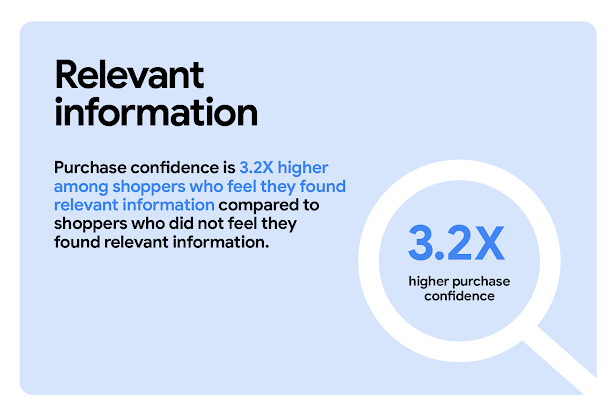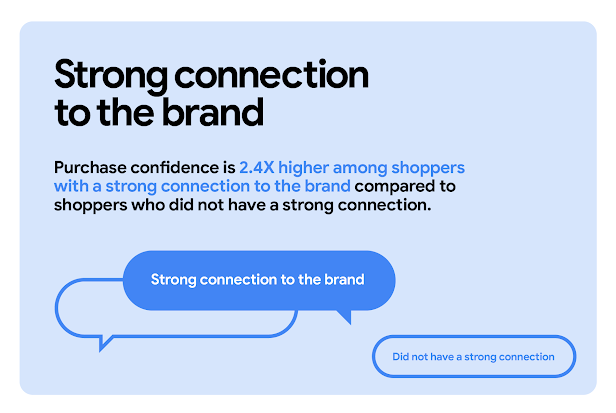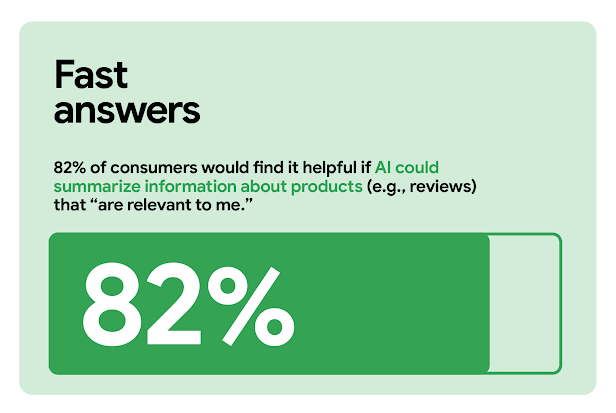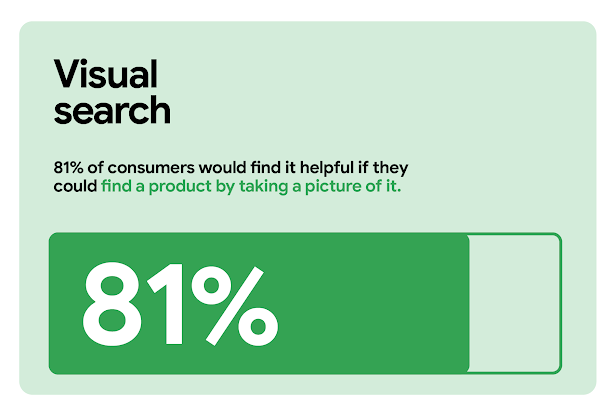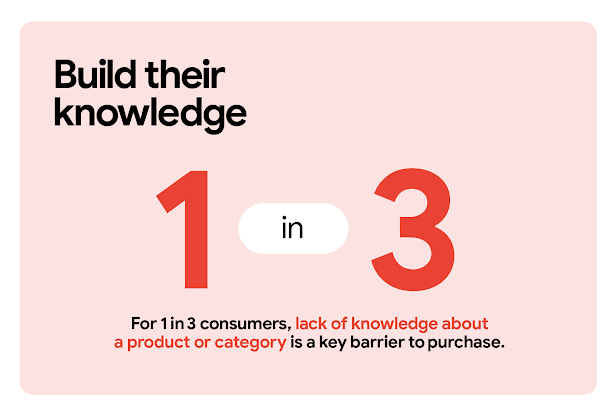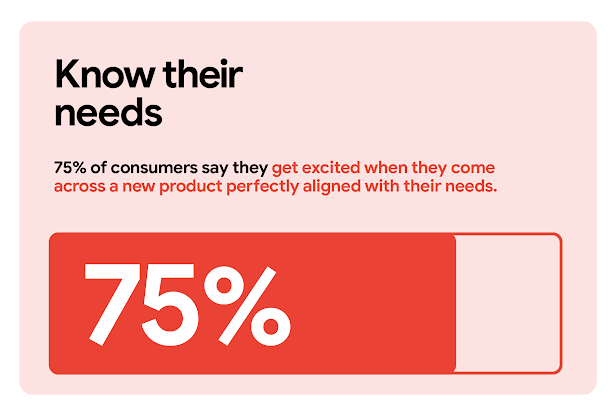Because us marketers are also consumers, we’ve been on both sides of the consumer journey. We know firsthand that the sense of infinite choice can be overwhelming. When two-thirds of consumers say that “making the right purchase decision requires more effort than it used to,”1 it indicates a barrier to confident decision-making.
We recently partnered with Ipsos on a survey of more than 18,000 people across 18 markets to determine how to overcome that barrier. Our study found that confident consumers were more likely to take meaningful actions that boost business performance over the long term. Aided by AI, any brand can help build the confidence consumers need to make assured purchase decisions based on information relevant to their evolving needs. Here’s how.
Understand what drives confidence
Fact: When people have the information they need to navigate their many options, shopping can be fun. In fact, only 12% of consumers said they didn’t find shopping enjoyable.2 The same complexity that poses a problem for consumers can also be rewarding to solve: 72% said they “feel a sense of accomplishment” when they make a decision on an important purchase.3
Confident consumers are more likely to make decisive purchases that improve metrics and the bottom line.
But faced with a sea of information, much of it of questionable relevance, shopping can be so overwhelming for some that they postpone or abandon it. Two-thirds of consumers say they delay or avoid making decisions when faced with too many options or information, and over half say they can’t afford to make the wrong purchase decision.4
No one wants to regret a purchase, and consumers reward brands that help them avoid that feeling. Confident consumers are more likely to make decisive purchases that improve metrics and the bottom line. For example, consumers who are highly confident at the point of purchase are 18X more likely to recommend the brand to family or friends than those with low confidence.5
Source: Google/Ipsos, AU, BR, CA, FR, DE, IN, IT, JP, MX, NL, SG, KR, ES, TW, TH, U.K., U.S., VN, The Relevance Factor, high confidence at purchase (n=6,499), low confidence at purchase (n=3,587) online shoppers 18+, March 2024.
What actually drives confidence? According to our study, the most confident consumers have higher category knowledge, more relevant information, and a relationship with the brand thanks to a previous purchase.
Confidence comes from:
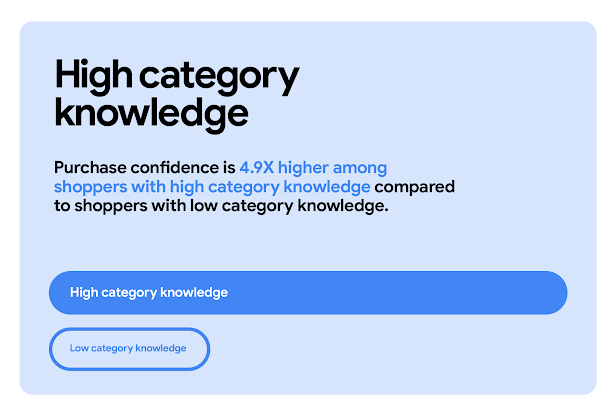
Any brand can contribute to consumers’ category knowledge by making information easy to find: 79% of consumers say they’re more confident when they feel they’ve done the necessary research.6 And just as important as discoverability is credibility: 75% of shoppers cross-check multiple sources to see if the information they find is true.7
Users say that Google is the No. 1 most trusted platform for delivering the right information at the right time.8 With that in mind, advertisers using Search campaigns and Performance Max campaigns to reach consumers across Google properties are already well positioned to deliver their message. When fueled by quality first-party data, these ads tools help ensure that what the consumer sees is relevant to them in the moment.
Leverage AI to unlock relevance
Marketers know the difference between relevance and personalization — and so do consumers. Our research shows that, when it comes to building consumer confidence, personalized information — such as individually addressed communications — lacks the timeliness to be relevant to users’ ever-changing and evolving needs, which heavily depend on where they are in their journey.
Consumers say relevant content aligned to their interests and needs is more important than content directed to them using only their personal information.
Consumers say relevant content aligned to their interests and needs is more important than content directed to them using only their personal information9 — though, ultimately, for marketers, there’s a balance to getting both right. Even more revealing: 75% of consumers said they want brands to demonstrate that they understand their needs, and 61% want that understanding reflected in branded communications.10
Source: Google/Ipsos, AU, BR, CA, FR, DE, IN, IT, JP, MX, NL, SG, KR, ES, TW, TH, U.K., U.S., VN, The Relevance Factor, n=18,003 online shoppers 18+, March 2024.
This level of understanding can be challenging for brands to demonstrate when today’s consumer browses multiple categories at any given time, conducting research, gathering information, comparing prices, and adding products to carts. Accounting for this dynamism makes being able to interpret consumer intent business-critical.
Despite the rapid proliferation of touchpoints across these activities, people know where to look for reliable answers. Consumers whose journeys included Google as a touchpoint were 1.7X more likely to find “very relevant” information.11 One user mentioned using Google Search to find answers when they only had a “rough image” of what they wanted. AI is integral to effectiveness in those situations, which makes consumers more open to using it.
AI is helpful for…
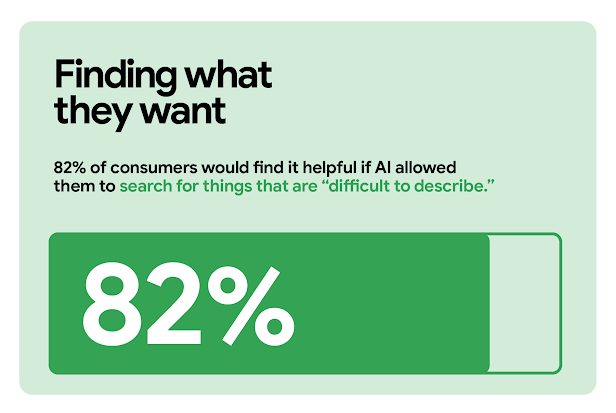
Consumers are also open to using AI tools to find more relevant options. In addition to Circle to Search, which lets people search anything with a simple gesture, we’re seeing people ask new types of questions involving longer and more complex queries with AI Overviews. Others are searching with photos using Google Lens. Research shows that demand for this kind of experience is on the rise, with 71% of consumers saying they would find tailored ads showing them relevant options helpful.12
Provide relevant help to become consumers’ first choice
Consumers’ openness to new products means brand preference is no longer a given. A clear tension exists between the tendency of consumers to stick to what they know and their propensity to get excited about new options. For example, 55% report that they continue to purchase products because it’s “easy,” even though they are sure there are better alternatives.13 With AI-powered ads tools like Demand Gen, unfamiliar brands can gain share by presenting new options.
Source: Google/Ipsos, AU, BR, CA, FR, DE, IN, IT, JP, MX, NL, SG, KR, ES, TW, TH, U.K., U.S., VN, The Relevance Factor, high confidence at purchase (n=6,499), low confidence at purchase (n=3,587) online shoppers 18+, March 2024.
The payoff speaks for itself: Highly confident consumers are 10X more likely to be very satisfied after buying and 6X more likely to say they would “definitely buy again.”14 And, while there’s no one-fits-all consumer strategy for building confidence, people do tend to reward brands that are able to ease their journey, build their knowledge, and know their needs.
3 ways to deliver relevance
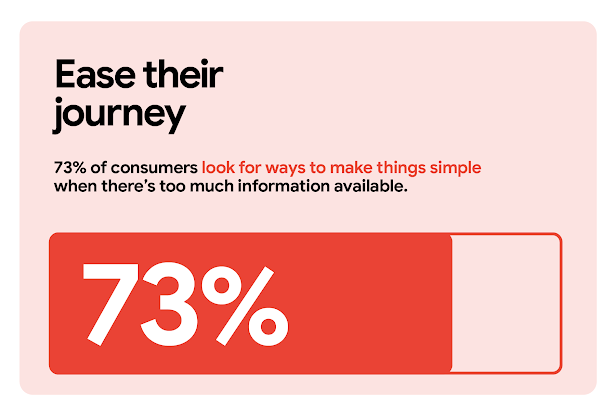
Keep things simple to ease their journey and build their knowledge. Searching and sifting through loads of information is hardly a guarantee of finding answers. The introduction of generative AI to Performance Max and conversational experience to Google Ads is already helping more brands determine what to highlight and when.
Finally, by leaning on brands that reflect an awareness of their needs, consumers can rest assured that what they are buying is worth it: 70% of consumers are looking for brands that understand their needs so they know they can rely on them.”15 Using Search campaigns and Performance Max campaigns together enables AI to help brands demonstrate an understanding of their needs when data may be limited.
Brands benefit when consumers have more confidence. Confident consumers improve valuable metrics, and empowering them means helping them navigate their complex journeys. By employing these strategies with the help of AI, brands can build credibility across online ad campaigns and other communications that help potential customers reach their destinations — and keep coming back.


